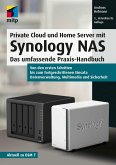This is the function of a NAS, or "Network Attached Storage" device. This file server does nothing except act as a go-between between the network and the hard drives. The Raspberry Pi, a super-inexpensive, low-power consumption, tiny computer, is just perfect for handling this task.
The software we will be installing to make this happen is called Openmediavault, or OMV for short. It's an open source project that is heavily developed and still getting new features regularly. OMV is the NAS software, but it all runs on the Linux operating system, which means it's stable and very reliable. Not to mention all this software is completely free of charge.
This book explains how to set up a Raspberry Pi for use as a NAS Server. We'll look at hardware options, downloading and installing the operating system and Openmediavault software, how to configure your hard drives (either with a single hard drive or as a dual-drive RAID system), folders, and files, how to get files into the Pi from other places in the house, and how to access everything from other devices on the network using secure user accounts. It's all you need to know, and only what you need to know!
Dieser Download kann aus rechtlichen Gründen nur mit Rechnungsadresse in A, B, CY, CZ, D, DK, EW, E, FIN, F, GR, H, IRL, I, LT, L, LR, M, NL, PL, P, R, S, SLO, SK ausgeliefert werden.
Hinweis: Dieser Artikel kann nur an eine deutsche Lieferadresse ausgeliefert werden.









